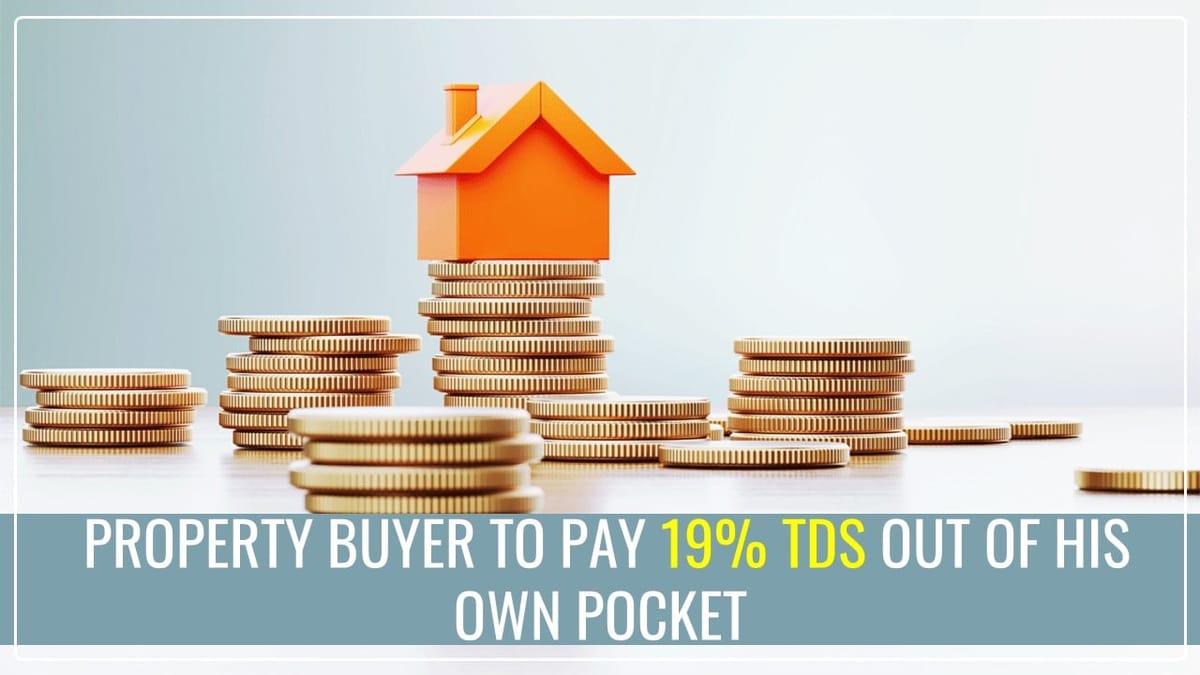When purchasing a property for more than Rs. 50 lakh, the buyer is required to deduct TDS, which is normally 1% of the property's value, before paying any sellers.
Reetu | Apr 15, 2024 |

19% TDS might have to be paid by Property buyer out of his own pocket for this PAN related issue
When purchasing a property for more than Rs. 50 lakh, the buyer is required to deduct TDS, which is normally 1% of the property’s value, before paying any sellers. Nevertheless, there is an exception to this rule that is related to the seller’s PAN status and could necessitate you to deduct more tax deducted at source (TDS).
You must check the property seller’s PAN-Aadhaar linkage status prior to purchasing. When paying token money and when making the ultimate payment for the property, this needs to be verified.
The expert says, “The buyer ought to confirm that the seller’s PAN is active even at the moment of token money payment. When our firm discovered that the seller did not realize that his PAN was inoperative, we forced him to pay the appropriate price and link his PAN with Aadhaar, but by then, the harm had already been done. The seller claimed not to know about this.”
According to tax experts, the income tax department would notify taxpayers that a smaller TDS amount was deducted even if they were eligible for a bigger deduction.
The property seller could not agree to refund you for the stipulated interest and TDS deficiency, which you would need to pay in order to address this situation. In the aforementioned example, the seller agreed to pay the buyer 19% of the property price as TDS deficit, but the buyer bore the interest burden.
A tax advisor said, “The TDS deductor bears the responsibility of checking whether the deductee’s PAN is inoperative. Should the deductor fail to verify the deductee’s PAN and deduct TDS at a lesser rate, the deductee may receive an intimation notice under section 200A for short deduction. It is important to remember that the deductor may be responsible for paying any interest that results from a short deduction. The deductee may be required to pay the difference in TDS, which is the sum of the TDS that has been deducted and the higher rate of 20%. Furthermore, under section 271C, the buyer may face criminal penalties; as a result, a penalty equivalent to the amount of tax he neglected to deduct or pay may be assessed.”
According to tax experts, if the seller of a property has an inoperative PAN after July 1, 2023, the buyer will have to deduct TDS at the higher rate of 20%.
In the event that there is a valid basis for a non-deduction or short deduction of such TDS, the buyer may choose to file an application for a condonation of delay. Alternatively, the buyer may recover the 19% discrepancy from the payments that must be provided to the seller.
The buyer is legally entitled to recoup the 19% TDS difference; but, a tax expert stated that since the buyer was expected to verify the seller’s PAN identity on the deduction date, it is likely that he will not be able to recoup any penal interest levied by the income tax department.
Under section 194-IA, the tax regulations make no mention of recovering the TDS amount from the seller. Therefore, it depends on the terms of the agreement and the understanding between the seller and the buyer regarding the seller’s liability for the amount of TDS or the seller’s recovery of such TDS.
The buyer would be considered an “assessee in default” under section 201 in the event that the TDS amount was not recovered.
However, there is an exception wherein such a buyer who has failed to deduct TDS would not be treated as an ‘assessee in default’ provided the seller satisfies the following conditions:
Failure on the part of the buyer to deposit the difference amount with the government will result in the buyer receiving an intimation notice under section 200A, interest being charged under section 201(1A), and the buyer potentially facing criminal consequences under section 271C, which would entail a penalty equal to the amount of tax that the buyer failed to deduct or pay.
In case of any Doubt regarding Membership you can mail us at [email protected]
Join Studycafe's WhatsApp Group or Telegram Channel for Latest Updates on Government Job, Sarkari Naukri, Private Jobs, Income Tax, GST, Companies Act, Judgements and CA, CS, ICWA, and MUCH MORE!"